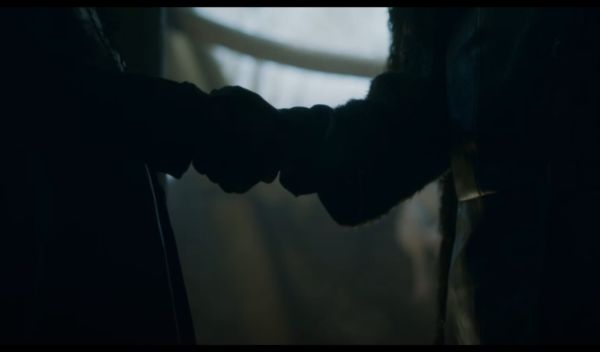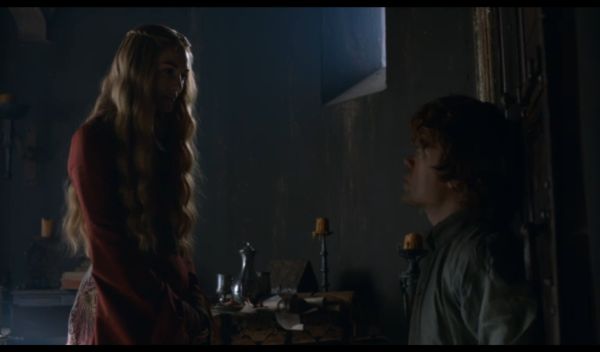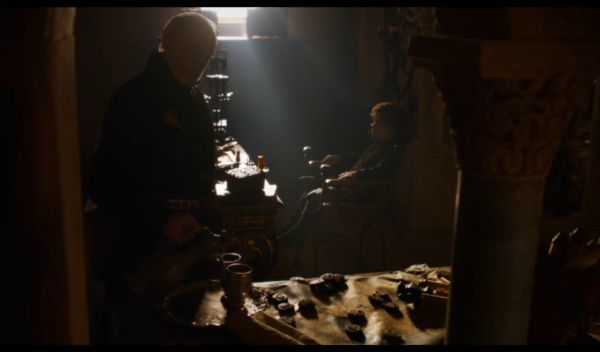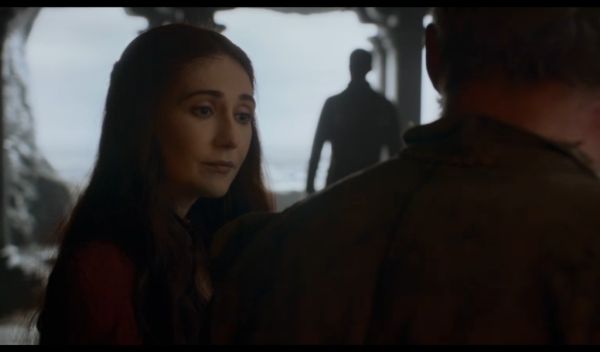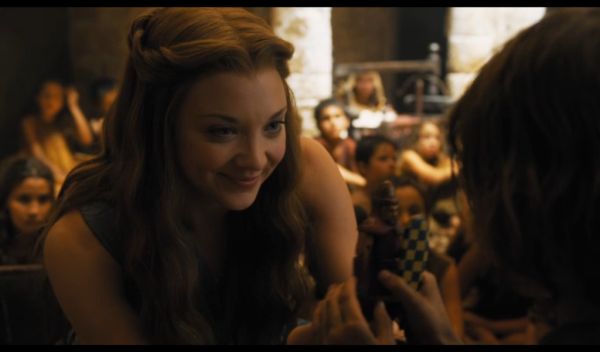| Boing Boing ( @ 2013-04-02 05:21:00 |
|
|
|
|
|
|
|
|
|
|
|
|
|
|
Funny thing about recaps: Some of the early feedback I got on the handful I did last season suggested people wanted less blow-by-blow, more macroanalysis. But I wonder how well that works for Game of Thrones: Friends, I've read all the books and watched every season so far twice, and I'd be lying if I said I didn't reach for a wiki a few times to make sure I had everything and everyone straight as we begin the third season.
I'm often afraid the show is going to shake less-obsessive Game of Thrones fans like a beauty in a bear pit, since we're reaching a critical mass of characters and politicking. Yet this is the season readers have anticipated most of all, and if the television adaptation has had one major strength so far it's its ability to abstract the muddy stuff and highlight over-arching themes.
I'll be your guide this season, and I'll try to focus on some of those themes, while seeing what I can do to help everyone keep their names, faces and facts straight as we return to the world of Westeros and beyond after a long, long winter.
I think the premiere deserves some extra details to make sure everyone knows exactly what's going on; if you just want some analysis, scroll to the end.
The season three premiere picks up quite literally where we left off: With unlucky Night's Watchman Samwell Tarly struggling through the snow as the blue-eyed, undead Others -- and the legion of Wights they seem able to reanimate -- begin approaching the Wall from the mysterious, inhospitable lands beyond it.
We've seen glimpses of this unknowable dread before in the series, but here's the point where we realize a legion of undead is going to be an issue for Westeros. An under-funded Night's Watch staffed mostly by ex-convicts and aging retirees is going to have a hard time holding these guys back -- and a harder time convincing anyone in the Seven Kingdoms to help out, given that their attention and their funds are tied up in their own wars for the throne.
We presume it'll be harder without Jon Snow, who's been dispatched to infiltrate the society of the Free Folk, who live beyond the wall so they can avoid the oppression and war that comes with living under a traditional king. In this episode, we meet Mance Rayder, leader of the free folk and former crow of the Night's Watch himself.
Mance is unimpressed when Jon awkwardly parrots rhetoric about freedom, but appreciates his more-truthful story about how the Watch's Lord Commander, Jeor "Old Bear" Mormont, ignored the sacrifice of male infants at Craster's Keep last season. Mance also probably appreciates the genuine romantic sparks he senses between Snow (who is adorably lateblooming about women) and Ygritte, the firehaired freewoman who's been his biggest advocate here.
Back at King's Landing, we join Tyrion, who's recovered from his war wound -- less so from the complete untangling his sister Cersei's done of his attempts to restore some degree of power and balance in Joffrey's mad kingdom. We find him examining a mirror and noticing his scar makes him even uglier than he once was -- a hallmark of this series is taking people in bad situations and making them worse.
Not that Peter Dinklage is actually ugly, mind. In the books, Tyrion actually loses part of his nose; the more restrained scarring he sustains here shows a healthy appreciation for his charismatic face. He will probably always be the best thing on this show, and HBO's April Fool's prank about him being replaced was momentarily sick-making, even knowing what day today is.
Lannister patriarch Tywin has come to town, after arriving at the last minute to save the city from certain ruin. Tywin brought me my favorite moment of last season: Cersei, about to take her son's life as she trembles with wine and brutal terror, leaping to her feet with all the delight and relief of a young girl when it's her father, not the invaders, who strides into the throne room to reveal he's saved her. There's an incredible dichotomy in Tywin Lannister, who as a character is getting one of the best and most luminous treatments of anyone on the show -- he's ruthless, yet we can admire him; we see why his children both hate and long for him. His scenes with Arya Stark (posing as his cupbearer) last season were some of the show's best.
Not that Tyrion can expect any similar sense of salvation from his father, who never conceals his open loathing for the son he views as twisted and deformed, and whom he will forever blame for the death of his wife in childbirth. Tywin is an excellent general but no kind of parent, and his attitude to strategy and efficiency strains and overhangs his dysfunctional, love-starved children.
Cersei's heard Tyrion requested a meeting with their dad, and comes to find out what he wants. "He's my father," Tyrion replies."Do I need to want something?" That's some elegant dark humor, there -- but there's also the leaden ache when we hear Tyrion describe to his sister how he lay with his face split in half, yet no visit from his only parent.
Tyrion may have had all his power taken away, but Cersei fears him anyway: She says she's afraid he'll tell lies, but it's plain it's the truth she's afraid of her father knowing: The nightmarish way she's let her son Joffrey trample the kingdom and run the family into the corner. Oh, yeah, and the whole bit where Cersei's kids are her brother's kids. That's kind of the big one.
All Tyrion wants, it seems, is stewardship of the family home back in Casterly Rock (his brother Jaime, having joined the Kingsguard, forfeits the right to hold lands). But even though Tyrion was the only Lannister kid to show any bravery during the fight at King's Landing, Tywin's venomous at the suggestion: In his eyes, his youngest son is the only thing he's ever done imperfectly.
Note dad's extreme offense at Tyrion's whoring; Tywin's own father apparently shamed the family by taking in a courtesan who indulged herself in the family's riches, and he can't abide the idea that his own son has brought a whore to King's Landing. Recall Tyrion confiding in Bronn and Shae about the nasty business his father put him through when he briefly married a whore as a youth. We see quite plainly how Tyrion came to be how he is: The cleverest of the children raised in the cunning Lannister mode, yet the least-loved. His closest ally right now is "upjumped cutthroat" Bronn, who's just asked for a pay raise for his "friendship."
Davos Seaworth has survived the wreckage of Stannis Baratheon's fleet during the Blackwater battle by clinging to a rock in the middle of the sea. When rescuers arrive, they demand to know what king he's served. The wrong answer, here, could have ended his life, and you see on his face how dearly he knows this. Yet Seaworth would die loyal, declaring himself for Stannis, the "one true king."
Seaworth is arguably one of the most moral and loyal characters in the entire narrative, yet Stannis is clearly twisted 'round the finger of the Red Woman, the sorceress Melisandre, and her fanatical worship of the Lord of Light. The pirate Sallador Saan, who contributed 30 ships to Stannis' war effort, believes Stannis' cause is lost and is bailing on Stannis, his ominous sorceress and her apparent penchant for burning nonbelievers.
Yet after everything Davos has sacrificed, Stannis, himself an obsessive, fanatical purist whose own late brother Renly told him no one wanted for king, sends his most loyal man to the dungeons for speaking agains the sorceress. We see how manipulative the priestess is when she implies she could have prevented deaths, including that of Davos' own son, if only Davos had not convinced Stannis to leave Melisandre behind during the Blackwater battle.
As for the Starks, they lost their Winterfell home primarily due to former ally Theon Greyjoy's prideful muddling, but it's clear Robb Stark's army blames the Lannisters, ignoring some of the subtleties of war in favor of a simplified -- and deeply personal -- vendetta against the family they hold responsible for the death of Robb's father Ned. In Robb's mind, the conflict is even more dangerously oversimplified: His main enemy is Jaime Lannister, and therefore the fall of Winterfell (and the slaughter of Northmen they discover here at Harrenhal) is the fault of his own mother, who set Jaime "free" (into the custody of Brienne of Tarth to be brought home, really) in a desperate exchange for her daughters.
Ros, the prostitute who ended up as Peter "Littlefinger" Baelish's business partner, tries to bond with Shae over having come up in the world; Shae, still successfully posing as Sansa's handmaid, evades the idea that they may have shared experience.The woman never says anything about herself, and wholly rejects Sansa's attempt to play imagination games with her. Littlefinger's attention to Sansa is slightly creepy, given the degree to which we know that he once desired her mother (and the degree to which we know he can't be trusted), but Sansa's finally brave enough to tell him to help her leave King's Landing.
The charismatic Tyrells have now joined the Lannisters via beautiful Margaery's wedding to Joffrey. But unlike the cowardly, squeamish and violent boy-king, she has no problem entering the poverty-stricken Flea Bottom to give gifts and food to the children -- and her willing vulnerability is an incredible foil to steely Cersei. The look on Cersei's face when Joff, who himself seems as interested in pleasing Margaery as anyone, suggests his mother is getting older is priceless.
Of course, no one in this show is simple, and viewing Margaery as simply a naively-charitable heroine would be a mistake. When she urges the head of the orphanage she visits to come to her if they need anything, her emphasis of "directly to me" could be viewed as a potential allusion to her motives. It'll be interesting, actually, to see how the show treats Margaery's objectives, since the books keep them obscured, and never let us get to know her well.
Finally, we rejoin Daenerys, who has reclaimed her dragons and escaped the incredibly inhospitable Qarth with a ship and the riches she's won from her enemies. Next, she needs an army, so she her right-hand man, Jorah Mormont, are headed to Astapor to check out some slave soldiers for sale. We see how the silver queen aches for her Dothraki, who are suffering sickness and terror for her, having never been on the "poison water" in the history of their tribes. We see how firmly the idea of slavery at all disgusts her; she'll be able to get a terrifying army bred from childhood for war, but given that each of them has to murder a baby in their training to ensure they have no "weakness," will she compromise?
Does she have a choice? Amid all the conniving and mistake-making of the Westerosi throne contenders, Daenerys' white-haloed morality is supposed to make us want her most of all for the throne. I wonder how people of extreme moral character manage to fare in this series?
For some analysis, I want to talk about Daenerys, because her story arc is obviously going to be the most challenging for the show's writers in the season ahead. Early in the story, hers is one of the most interesting narratives: She begins a terrified girl, estranged from her royal background and at the mercy of her vicious brother Viserys. She's managed to dodge the Targaryen family madness; he hasn't. While he makes a desperate, irrational bid for power, she simply dreams of having her own home. When she's sold as an adolescent bride to a terrifying, wild horselord, we feel for her, and when she falls in love and learns to claim some power within a society completely foreign to her, we root for her. By the time Khal Drogo dies and Dany takes leadership of the Khalasar, we believe she can be a contender for the Iron Throne in her own right.
But in the books, she often feels like an off-note from the time she comes into power onward: it's hard to forget she is written in lavish physical detail by a nerdy old guy who likes describing her breasts or her various states of arousal. There is a certain theft of dignity that happens to Daenerys that doesn't happen to Cersei, Arya, Sansa or Catelyn; Daenerys is a very young woman learning to become a moral authority, and this episode presents the way her desire to right impossibly large and deeply-ingrained wrongs such as global poverty or slavery in cultures that have a certain peace with slavery will conflict with her ultimate goal of queendom.
Emilia Clarke as Daenerys often wears an expression simultaneously noble and soft, the kind you expect to see etched on a royal seal, and the way the camera lavishes on her -- a small, beautiful but insistent figure surrounded always by eerie predators -- is currently maintaing a delicate balance between the ways we're meant to see her as simultaneously righteous and powerless. Readers who are Dany fans seem to often feel like they don't know what the books will do with her; it's interesting to see what the show will do with her (I've read that Clarke begged George R.R. Martin to know; if I were her, I'd be the member of the cast begging the hardest, too).
As the premiere closes, we see longtime Kingsguard commander Ser Barristan Selmy save Daenerys from a trap that exploited her own faith in people (believing a child offering her a ball was simply that, and not a warlock offering her a scorpion). Recall how Selmy was dismissed by Joffrey for being too aged? Now, Dany has a new champion -- and look how anxious this seems to make Mormont.
Loyalty is really the overarching theme of this episode; its title, Valar Dohaeris, is High Valyrian for "all men must serve" (versus the title of the Season 2 finale, Valar Morghulis, or "all men must die"). How important is allegiance, Jon Snow is wondering as he tries to prove himself to Mance, and what happens when you misplace your loyalty -- or in the case of Robb, or Tywin, or Cersei, or Davos, your blame?
This season's set to be disaster porn -- book fans are especially excited about season 3 because they cannot wait to see terrible things happen to important characters. Saying so is hardly a spoiler; it's Game of Thrones! If you want to see empowering narratives, watch Girls... er, wait. I got nothin'.
